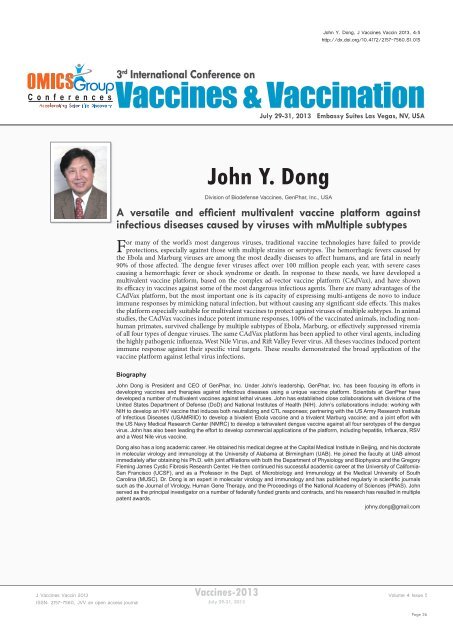Vaccines-2013 - OMICS Group
Vaccines-2013 - OMICS Group
Vaccines-2013 - OMICS Group
Create successful ePaper yourself
Turn your PDF publications into a flip-book with our unique Google optimized e-Paper software.
John Y. Dong, J <strong>Vaccines</strong> Vaccin <strong>2013</strong>, 4:5http://dx.doi.org/10.4172/2157-7560.S1.0153 rd International Conference on<strong>Vaccines</strong> & VaccinationJuly 29-31, <strong>2013</strong> Embassy Suites Las Vegas, NV, USAJohn Y. DongDivision of Biodefense <strong>Vaccines</strong>, GenPhar, Inc., USAA versatile and efficient multivalent vaccine platform againstinfectious diseases caused by viruses with mMultiple subtypesFor many of the world’s most dangerous viruses, traditional vaccine technologies have failed to provideprotections, especially against those with multiple strains or serotypes. The hemorrhagic fevers caused bythe Ebola and Marburg viruses are among the most deadly diseases to affect humans, and are fatal in nearly90% of those affected. The dengue fever viruses affect over 100 million people each year, with severe casescausing a hemorrhagic fever or shock syndrome or death. In response to these needs, we have developed amultivalent vaccine platform, based on the complex ad-vector vaccine platform (CAdVax), and have shownits efficacy in vaccines against some of the most dangerous infectious agents. There are many advantages of theCAdVax platform, but the most important one is its capacity of expressing multi-antigens de novo to induceimmune responses by mimicking natural infection, but without causing any significant side effects. This makesthe platform especially suitable for multivalent vaccines to protect against viruses of multiple subtypes. In animalstudies, the CAdVax vaccines induce potent immune responses, 100% of the vaccinated animals, including nonhumanprimates, survived challenge by multiple subtypes of Ebola, Marburg, or effectively suppressed viremiaof all four types of dengue viruses. The same CAdVax platform has been applied to other viral agents, includingthe highly pathogenic influenza, West Nile Virus, and Rift Valley Fever virus. All theses vaccines induced portentimmune response against their specific viral targets. These results demonstrated the broad application of thevaccine platform against lethal virus infections.BiographyJohn Dong is President and CEO of GenPhar, Inc. Under John’s leadership, GenPhar, Inc. has been focusing its efforts indeveloping vaccines and therapies against infectious diseases using a unique vaccine platform. Scientists at GenPhar havedeveloped a number of multivalent vaccines against lethal viruses. John has established close collaborations with divisions of theUnited States Department of Defense (DoD) and National Institutes of Health (NIH). John’s collaborations include: working withNIH to develop an HIV vaccine that induces both neutralizing and CTL responses; partnering with the US Army Research Instituteof Infectious Diseases (USAMRIID) to develop a bivalent Ebola vaccine and a trivalent Marburg vaccine; and a joint effort withthe US Navy Medical Research Center (NMRC) to develop a tetravalent dengue vaccine against all four serotypes of the denguevirus. John has also been leading the effort to develop commercial applications of the platform, including hepatitis, Infl uenza, RSVand a West Nile virus vaccine.Dong also has a long academic career. He obtained his medical degree at the Capital Medical Institute in Beijing, and his doctoratein molecular virology and immunology at the University of Alabama at Birmingham (UAB). He joined the faculty at UAB almostimmediately after obtaining his Ph.D. with joint affi liations with both the Department of Physiology and Biophysics and the GregoryFleming James Cystic Fibrosis Research Center. He then continued his successful academic career at the University of California-San Francisco (UCSF), and as a Professor in the Dept. of Microbiology and Immunology at the Medical University of SouthCarolina (MUSC). Dr. Dong is an expert in molecular virology and immunology and has published regularly in scientifi c journalssuch as the Journal of Virology, Human Gene Therapy, and the Proceedings of the National Academy of Sciences (PNAS). Johnserved as the principal investigator on a number of federally funded grants and contracts, and his research has resulted in multiplepatent awards.johny.dong@gmail.comJ <strong>Vaccines</strong> Vaccin <strong>2013</strong>ISSN: 2157-7560, JVV an open access journal<strong>Vaccines</strong>-<strong>2013</strong>July 29-31, <strong>2013</strong>Volume 4 Issue 5Page 36


